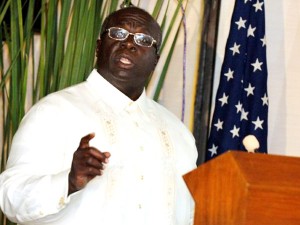US envoy: War games our devotion to peace
The annual Balikatan military exercises between the Philippines and the United States are about “working together in the spirit of the Mutual Defense Treaty” and in keeping with the two allies’ “heightened cooperation on the breadth of bilateral, regional and global issues,” US Ambassador to Manila Harry Thomas Jr. said Wednesday.
The war games are “about our common devotion to peace that has sustained our alliance through the years,” Thomas said in a statement from the US Embassy.
“Over many decades, we have forged an enduring friendship and this experience can only make it stronger,” Thomas said.
He added: “With our 28th Balikatan, we may all rest assured that when our two militaries carry out a mission together, the result will be far greater than the sum of its parts. In other words, we accomplish together what we could never accomplish by ourselves. And that is what this endeavor is all about. Shoulder to shoulder, magka-Balikatan.”
Asean members, too
Apart from the 2,300 Philippine troops and 4,500 US soldiers, several dozen participants from the Association of Southeast Asian Nations and from other partner countries are also taking part in the military exercises, Thomas said.
“This gathering represents an incalculable number of hours spent planning, bringing together the necessary assets and simply getting themselves here,” Thomas said. “But the numbers do not tell the whole story. True to the meaning of Balikatan, this exercise is about a great partnership between the Philippines and the US,” he said.
“This is about working together in the spirit of our 61-year-old Mutual Defense Treaty,” Thomas added.
For its part, the Armed Forces of the Philippines said Balikatan was “designed to enhance both military forces’ interoperability not only in traditional military training but also in reaching out to communities in need of urgent assistance.”
Running from April 16 to 27, the joint military exercises kicked off on Monday amid a standoff between the Philippines and China at Panatag Shoal, internationally known as Scarborough Shoal, in the West Philippine Sea (South China Sea).
This year’s Balikatan includes field training exercises on counterterrorism and maritime security in Palawan province; medical aid and jungle survival in the provinces of Nueva Ecija and Pampanga, and humanitarian aid and disaster response in Camp Aguinaldo, Quezon City.
As in past years, the two forces will work on civic projects, such as building classrooms, and conducting medical and dental missions in the communities hosting the exercises.
Fort Magsaysay
The first major field exercises will take place on April 21. The exercises will be held at Fort Magsaysay, the sprawling Army training camp in Nueva Ecija.
The Philippine exercises spokesperson, Major Emmanuel Garcia, said the joint training would include combat-casualty evacuation, platoon force on force, explosive-ordnance operations and community relations.
Simulated combat
On April 24, further exercises are scheduled to be conducted in Fort Magsaysay.
Aside from the previous exercises, live-fire exercises, medical training and simulated combat are to be conducted.
The exercises in Palawan will start on April 22 with a bilateral boat raid. An amphibious raid exercise will be conducted on April 25.
The nine-day large-scale bilateral exercises will end on April 25.
Protests
On Monday, the militant groups Bagong Alyansang Makabayan (Bayan) and the International League of People’s Struggles launched a series of mass actions across the country to protest the Balikatan exercises.
Bayan secretary general Renato Reyes Jr. said Balikatan was “but part of a bigger design to make American troops a permanent fixture in the Philippines even without any formal basing treaty.”
“The hype surrounding the failed North Korean rocket launch and the US statements on the dispute in the South China Sea are clearly intended to justify the permanent presence of American troops in Philippine territory and the region,” Reyes said. Reports from Jerry E. Esplanada and Dona Z. Pazzibugan
